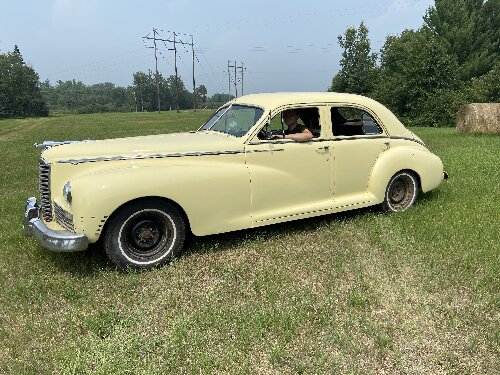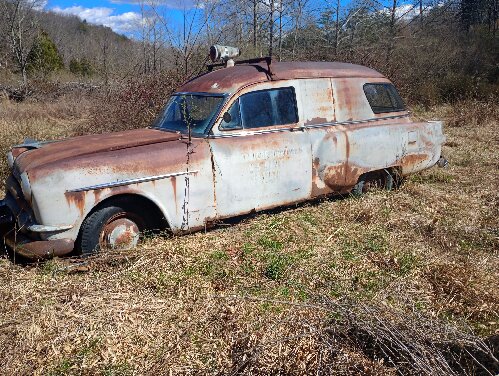|
Re: TrevorK's 1955 Packard Patrician
|
||||
|---|---|---|---|---|
|
Home away from home
|
I'd agree that it would be a logical conclusion that it must have been an additive that caused the accelerator pump to fail, except there was no additive in the tank at that time. Just gasoline. So we'll never know exactly what happened.
Either way, all is well with the vehicle. Just focusing on regular maintenance to lessen the chance of any surprises while I'm out enjoying it.
Posted on: 2017/6/9 15:41
|
|||
|
||||
|
Re: TrevorK's 1955 Packard Patrician
|
||||
|---|---|---|---|---|
|
Quite a regular

|
I have had this happen to accelerator pumps, as well as the modern submersible fuel hoses, which are supposed to be ethanol resistant. It is not a consistent failure, but has happened on and off over the years.
What might be happening is that all of the new fuels are "blends", and as such, are made up of many different chemicals. As they sit in either the stations tank, or your gas tank, the different chemicals tend to separate, and depending of the frequency of sales one person might get more of chemical "A" verus an even blend of A, B, and C. I have had cars towed in, which quit running shortly after getting gas. Drain the tank, put in a few gallons of gas, and they start up again as if nothing happened. The stuff that came out of the tank, while appearing to be gas, would not burn. This has happened several times over the years, and seems to happen more often with the 93 octane. This might be because when gas prices were high, everyone was getting by on 87 octane, as it was cheaper, so my assumption is the 93 octane, just sat in the gas stations tanks, waiting to be sold. My lawn mower, which is supposed to run just fine on 10% ethanol gas, often needs the carb torn down several times a year, as parts inside of it appear to get "sticky". Regarding "lined" gas tanks.. I have seen a very high failure rate on these, many of which were lined by their owners, thus I would attribute these failures to owners not prepping or cleaning the tank properly. Now, what is concerning, is that I have had other cars, all of which had their tanks professionally lined, by companies such as Renu, and these have failed as well. Part of this I feel is that the petroleum companies are introducing new chemicals and solvents into fuels, and the tank liners cannot hold up against some of them. We are fortunate enough to have a Murphey's gas station, which sells old fashioned, non ethanol gas. I use this on all my old cars, and have not had any problems with accelerator pumps, or fuel tanks rusting after only sitting 6-8 months.
Posted on: 2017/6/9 21:23
|
|||
|
||||
|
Re: TrevorK's 1955 Packard Patrician
|
||||
|---|---|---|---|---|
|
Forum Ambassador

|
Hi Jack:
Everyone's experiences are different and mine are at the complete opposite end of the spectrum from you. The only fuel available in my part of New Jersey is 10% ethanol gasoline and it's the only fuel my lawn mower, chain saw, log splitter and snow blower have ever seen and none have ever (15 years with the lawn mower) had a problem with the carburetors or anything else for that matter. Likewise never had a fuel problem with either of my Packards with this 10% stuff. My gas tank was lined before the introduction of ethanol in gas (back in the days of MBTE oxygenate) with the Bill Hirsch product and likewise has never had any problems. My '34 carburetor was rebuilt back in the late 60s, has a leather accelerator pump, has never been serviced since and continues to function today as well as it did when installed. Yes, when E10 came out I did rebuild the fuel pumps and replace rubber flex lines on the Packards. Don't get me wrong, I thoroughly abhor the E10 on economic and political grounds but never had a performance issue with it. Plenty of hot weather touring miles, parade crawls on July 4th etc.
Posted on: 2017/6/10 9:03
|
|||
|
||||
|
Re: TrevorK's 1955 Packard Patrician
|
||||
|---|---|---|---|---|
|
Home away from home

|
From my experience, cars that are gassed up and quit running shortly afterwards have gotten some water with the gas. The poster said that the stuff won't burn...guess what! As far as I know the things "blended" into gasoline mix fully and evenly and do not settle out. Octane is on thing blended in and the bottom of the tank and the top are the same octane rating.
Owen can explain the chemistry behind this. My 57 year experience is the same as Owens, I attribute opposite experience to misunderstanding, misdiagnosis and incorrect conclusions. How else could 2 long experienced automobilists have problem free 50 year histories??
Posted on: 2017/6/10 11:53
|
|||
|
||||
|
Re: TrevorK's 1955 Packard Patrician
|
||||
|---|---|---|---|---|
|
Quite a regular

|
Fred, respectfully, you did not understand, or perhaps fully read my post. I never said that the octane at the top or the bottom of a tank was different..... from where do you draw that conclusion?
As to water being in the tank, the vehicle in question was gassed up that day, and quit shortly after leaving the gas station. The stuff removed would not burn, but certainly was not water, as it would would make short work of greasy engine parts. We kept it around the shop for a few weeks, until it became too dirty for further use. The owner of the car, a local attorney, complained to the gas station, and they paid the repair costs in full. The same thing evidently happened to several people on the same day, and they did suspend gas sales for a couple of days.
Posted on: 2017/6/10 13:46
|
|||
|
||||
|
Re: TrevorK's 1955 Packard Patrician
|
||||
|---|---|---|---|---|
|
Home away from home

|
did not draw an conclusion from anywhere about the octane.You stated that gas has additives and I chose on additive present in all gasoline, octane. From that I made a statement of fact.
I have witnessed and gotten gas with water in it and the station has to close until the water (at the bottom of the tank) is pumped out. Anything in a tank that is not water will be some petroleum product and all petroleum products burn. Water does not make "short work" of greasy engine parts as they are protected by the grease..Any water entering the fuel system first reaches the fuel pump then the carburetor which are white metal, not greasy and not affected by water. should the water reach the combustion chamber there is no "grease" there, what is mostly there are carbon deposits. Water in the fuel system will not reach the crankcase or other greasy areas of the engine. If perhaps some small amount reaches the combustion chamber and leaks down past the rings, it will join the condensation down there which is part of normal operation
Posted on: 2017/6/10 16:18
|
|||
|
||||
|
Re: TrevorK's 1955 Packard Patrician
|
||||
|---|---|---|---|---|
|
Quite a regular

|
Fred, once again, you jumped to an erroneous conclusion. The stuff pumped out of the tank was kept at our shop, and it did in fact make "short work" out of greasy engine parts... meaning that we used it as a cleaner. To be completely clear, we kept it in a drum and would soak the greasy parts off of the engines that we were rebuilding in house.
Water will not make short work out of grease, unless it's used in a pressure washer situation. Fred, I have been around cars for decades, and I know what water in a tank will do, how it acts, etc. Thanks for the lesson, but you aren't talking to a newbie on these matters. Also, the vehicle affected by the bad gas was not a classic, or carb equipped vehicle, rather it was a 2005 Lincoln Town Car, so no carbs or mechanical fuel pumps to be had. To be clear, were it solely water in the tank, it would not have acted as a solvent for grease, (once again, parts soaked in a drum, not parts on a running engine) All of which begs the question, what was it in the tank?? Certainly NOT water, as it made an excellent solvent, but rather, something which would not burn.
Posted on: 2017/6/11 18:07
|
|||
|
||||
|
Re: TrevorK's 1955 Packard Patrician
|
||||
|---|---|---|---|---|
|
Home away from home

|
The term "short work" means to me that it was ruined. The ax made short work of the tree, the hammer made short work of the chain. Thus I concluded that the fluid ruined the greasy engine parts by rusting them.
A clearer description such as "the fluid dissolved the grease on the engine parts" would leave no space fro confusion. thanks
Posted on: 2017/6/11 23:27
|
|||
|
||||
|
Re: TrevorK's 1955 Packard Patrician
|
||||
|---|---|---|---|---|
|
Home away from home
|
So back on the topic of my car, a quick update as to what's what.
My mechanic has had the car for 3 weeks right now, no biggie as I knew he wouldn't be able to get to it for a bit and it has been hot as hell here - not any kind of weather I'd want to be driving around in. So 1 sticking lifter lead to 2 which lead to 3 - it was a constant clattering cacophony. Oil pressure was good and my guy says it doesn't appear to be an oiling issue - I was sure to ask. But he says it looks good in that area. He recommended changing out all of the lifters at once instead of just the ones that are sticking - being the risk averse, project manager that I am, I agreed. A week for the parts to arrive and probably another week before I have my car back. No complaints, but I guess some of that work I was planning for winter 2017 is going to have to move to winter 2018! As a side note, I'm selling my 1985 Benz 380SE if anyone is interested...three cars for one person just seems a little much.
Posted on: 2017/6/21 17:26
|
|||
|
||||

 (471.29 KB)
(471.29 KB)







